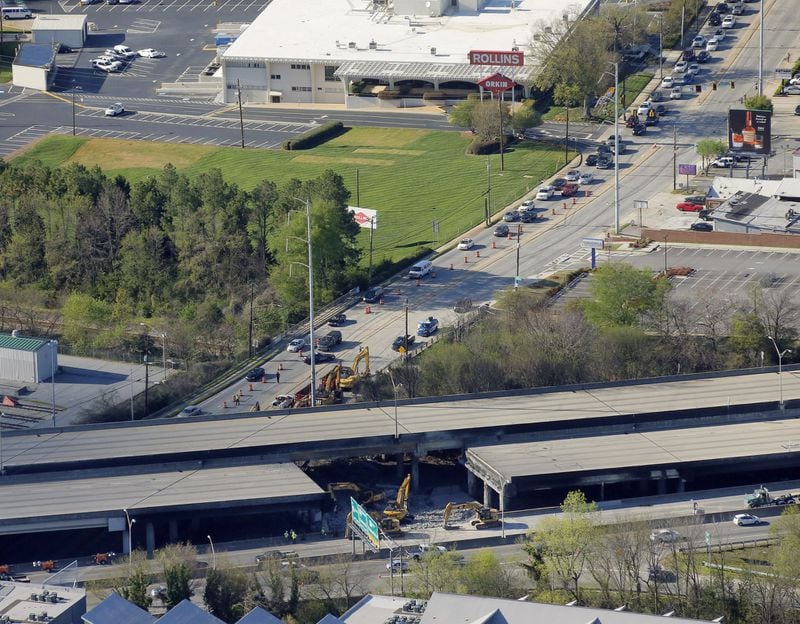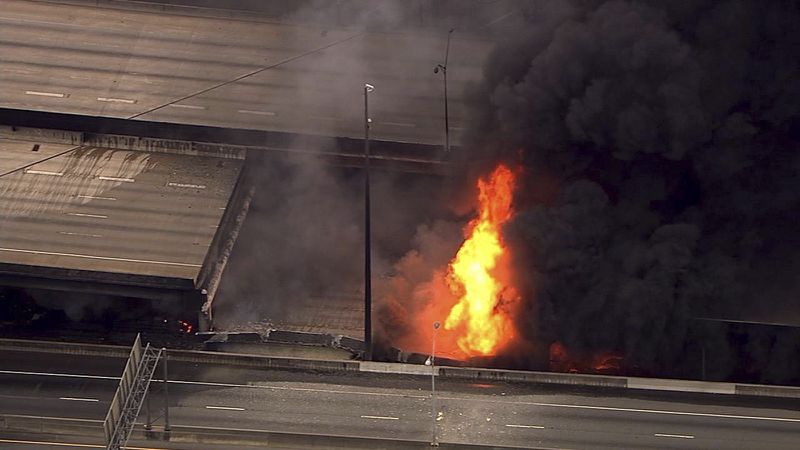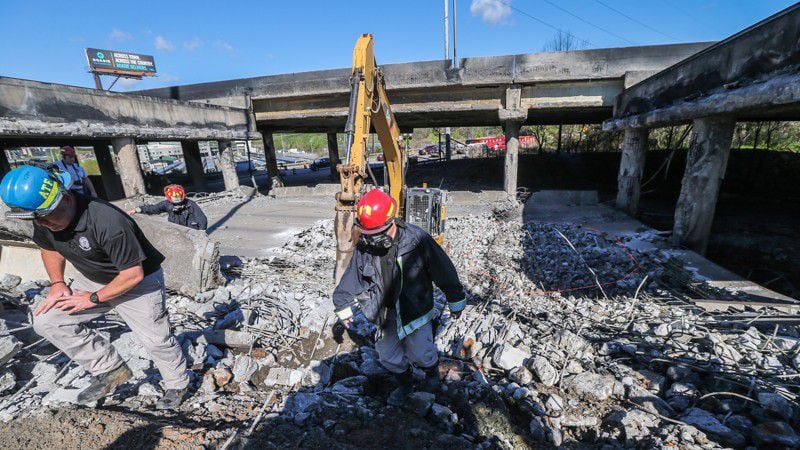A year after a colossal fire fueled by construction materials destroyed a section of I-85 in Atlanta and disrupted the lives of hundreds of thousands of commuters, Georgia officials say they're doing everything they can to ensure it never happens again.
They’ve surveyed state highways to make sure no combustible material lurks beneath. They’ve notified other states about the details of the fire so they can protect their own highways. And they’re cooperating with ongoing federal and state investigations that could yield new rules for storing construction materials like the ones that fed the I-85 fire.
Georgia Department of Transportation Commissioner Russell McMurry said the agency will revise some policies when those reports are released in the coming weeks. But he said the agency has already changed the way it stores such material as a precaution.
“Quite simply, our policy will say not to store flammable or combustible material under bridges,” McMurry told The Atlanta Journal-Constitution this week.
If that seems like a no-brainer in retrospect, it wasn’t obvious to GDOT before a fire shut down one of the busiest highways into Atlanta last March 30.
LEARN MORE: PHOTOS FROM THE 2017 COLLAPSE
The blaze allegedly was set by a homeless man beneath I-85 near Piedmont Road. It spread to high-density plastic conduit GDOT had stored under the bridge for years.
The spectacular fire destroyed 350 feet of highway in both directions. Its aftermath alternately confounded and amazed metro Atlanta for weeks.
Traffic – already awful – became nearly unbearable as commuters sought alternative routes to work. They tried everything from MARTA to a variety of short-cuts that just made traffic worse on other highways and local roads.
Carmen Dixon still hasn’t driven past the spot where she felt the heat from flames shooting skyward next to her car. The ensuing construction caused her to take Peachtree Street from her home in Riverdale to her job in North Druid Hills job processing medical records.
“At the time, I was in shock because I’d never seen that much fire before up close,” she said.
‘It was an act of arson’
Even as it made traveling miserable, the reconstruction effort captivated the region. With GDOT offering a $3.1 million incentive to get the work done quickly, contractor C.W. Matthews worked 24-hours a day to rebuild the stretch of highway.
Using "accelerated construction" techniques and expensive quick-curing concrete, the contractor was able to complete the work in just six weeks – a full month ahead of schedule.
The recent collapse of a pedestrian bridge at Florida International University has raised questions about accelerated construction. But GDOT has assured the public that the I-85 bridge and others completed with similar techniques are safe.
An October 2017 inspection of the new bridge found no deficiencies, according to GDOT spokeswoman Natalie Dale.
Before the blaze was completely extinguished, questions swirled about the cause of the fire – and who was to blame.
Credit: Bob Andres
Credit: Bob Andres
At the time, GDOT said it was common practice to store construction materials under highway bridges – though the AJC found several states that prohibit the practice. The agency also noted it had secured the materials behind a locked gate, though the newspaper found evidence the gate was hardly secure.
The homeless man who allegedly set the fire, Basil Eleby, was charged with arson. But in December his case was transferred to Fulton County’s Behavioral Health Treatment Court. If Eleby completes a mental health court program, which will take about 18 months, the charges against him will be dropped.
Meanwhile, the National Transportation Safety Board is reviewing the storage practices that contributed to the fire. That could lead to new rules for storing materials under highways.
The state fire marshal also is reviewing GDOT’s storage practices and is expected to release its recommendations after the NTSB releases its findings.
McMurry said the ultimate blame for the bridge collapse lies with Eleby.
“It was an act of arson,” he said. “But if the material wasn’t there, obviously it wouldn’t have happened.”
Despite questions about its own role in the blaze, GDOT has won widespread praise for its handling of the bridge reconstruction. And the State Transportation Board rewarded McMurry with a $100,000 raise last summer.
McMurry said GDOT no longer stores construction material under highways. That change also applies to other materials, like construction barricades.
“[The fire] gave us a bigger awareness of potential risk, which has driven us to make sure we don’t have those kind of things out there,” he said.
Staff writers Ben Brasch and Becca Godwin contributed to this report
I-85 bridge collapse
The story so far: I-85 collapsed in Buckhead on March 30, 2017, after a homeless man allegedly set a fire that spread to construction material the state stored under the bridge. The highway reopened just six weeks later.
The latest: The Georgia Department of Transportation says it no longer stores combustible material under highways.
What's next: The National Transportation Safety Board and the state fire marshal are reviewing the practice of storing materials under highways. Their reports may be released in coming weeks.
MYAJC.COM: REAL JOURNALISM. REAL LOCAL IMPACT.
The AJC's David Wickert keeps you updated on the latest in what's happening with transportation in metro Atlanta and Georgia. You'll find more on myAJC.com, including these stories:
Never miss a minute of what's happening in Atlanta transportation news. Subscribe to myAJC.com.











